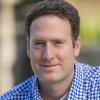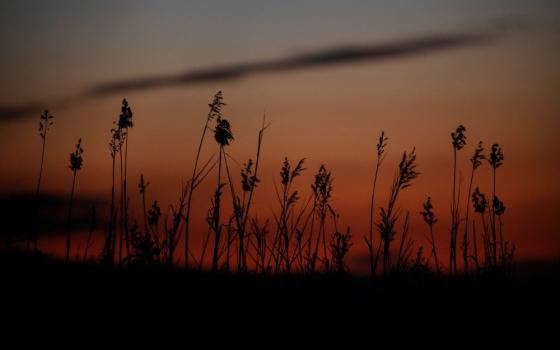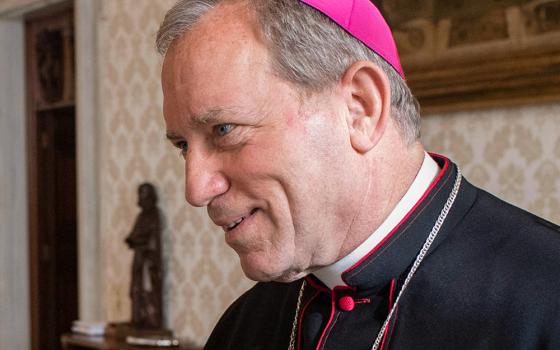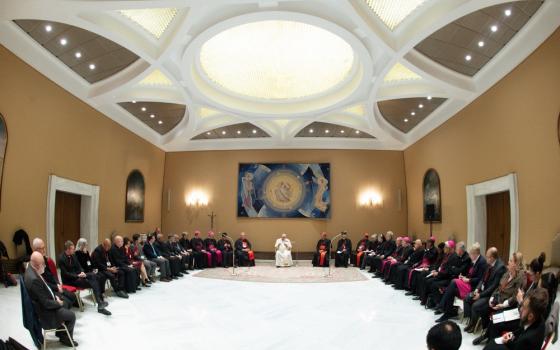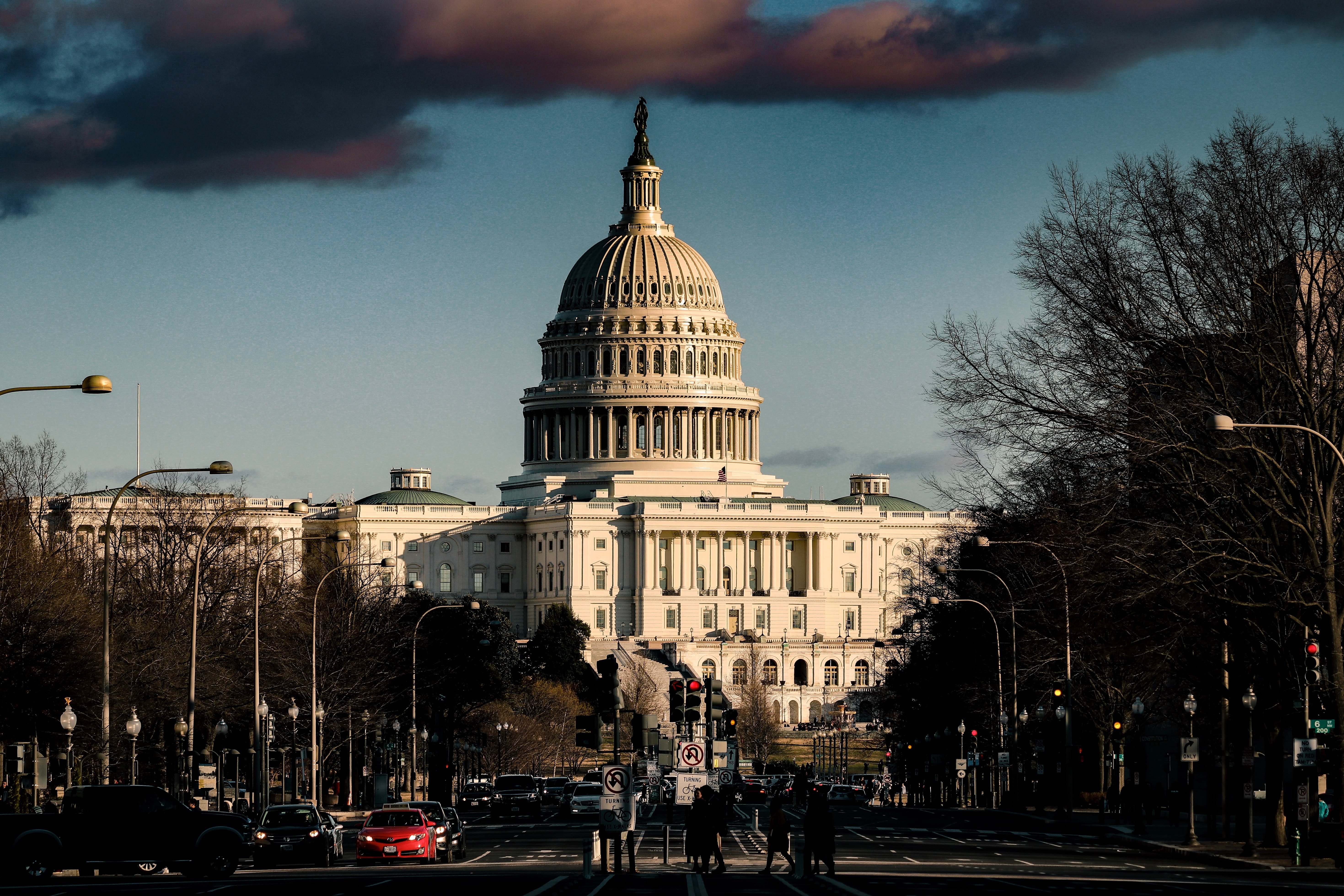
The United States Capitol in Washington, D.C. (Unsplash/Matt)
Pope Francis is expected to appoint a new archbishop of Washington in the coming days, a high-profile pick that will be one of the most pivotal of his papacy given the nature of this unusual see and the fact that its two most recent leaders have been embroiled in the clergy sex abuse scandal.
If evaluated merely by geographical size and statistics, the Archdiocese of Washington doesn't rank as one of the heavyweights of American Catholicism. New York and Los Angeles easily elbow out the nation's capital in sheer numbers of Catholics. Boston has bragging rights as a cradle of the Irish-American success story, a city where towering archbishops once defined the Catholic braggadocio of an era when the Church loomed large as a potent cultural force.
Yet none of those cities is situated at the epicenter of political power, a town where the archbishop's neighbors include the White House, the Supreme Court and Congress, along with blocks filled with embassies and major global institutions such as the the International Monetary Fund. Washington is also headquarters for the U.S. Conference of Catholic Bishops, where the hierarchy's robust lobbying efforts on national and international public policy issues are coordinated by a staff of several hundred people. The bishops conference is located across the street from another prominent address, the Catholic University of America, a pontifical university where the archbishop serves as the chancellor to the board of trustees.
This ecosystem of secular and church politics — in the wealthiest and most powerful country in the world — makes the archdiocese unique. The task of navigating it all requires a deft leader who can serve both as a politician and a pastor to a sprawling diocese that includes rural stretches of southern Maryland, wealthy enclaves of Potomac and gentrifying Washington, D.C., neighborhoods where longtime black residents are fighting to hold on as luxury condos crowd out affordable housing.
Along with parishes where influential Catholics in media and politics across the ideological spectrum worship together, the archdiocese has a vibrant Hispanic community, a rich history of African-American Catholicism, and a network of Catholic social justice organizations that bring activist energy to a range of causes. In a town with no shortage of opinion shapers and think tanks on the left and right, Washington is also a place where the Catholic commentariat is turned up on full volume, from the liberal-inflected salons at Georgetown University to the Catholic Information Center on K Street, a hub for conservative Catholics run by an Opus Dei priest where high-profile converts to Catholicism, including Newt Gingrich and current White House economic adviser Larry Kudlow, were tutored in the faith.
Advertisement
A few hours before teaching a class at Georgetown University, the Washington Post columnist E.J. Dionne Jr. reflects on that diverse milieu over a breakfast sandwich and coffee at Saxbys, a popular café around the corner from the oldest Catholic university in the United States, a Jesuit institution founded in 1789. A Catholic who often attends Mass at St. Bartholomew's in Bethesda and Our Lady of Mercy in Potomac, Dionne writes frequently about the intersection of faith and politics. He covered the Vatican for the New York Times during the papacy of John Paul II. "You have a lot of outspoken Catholic progressives here and also a lot of outspoken conservatives," Dionne said. "How they relate to the archbishop of Washington really matters because that sets the tone of Catholic life."
"One of the toughest"
A town filled with big political egos, a Catholic intelligentsia class and the backdrop of a national stage makes for a challenging, if intriguing, assignment for any bishop.
"I think it's one of the toughest dioceses to manage," said Msgr. John Enzler, president and CEO of Catholic Charities in Washington who grew up in a suburb outside the district and is a fixture at gatherings that bring together civic, political and religious powerbrokers in the city. The priest knows the two socioeconomic worlds and vast racial divides here better than most. Along with his advocacy for the poorest residents of Washington, where in the southeast quadrant of the city child poverty rates mirror those in developing countries, Enzler also spent years in wealthy parishes and elite institutions, including Georgetown Prep.
The private school a few miles outside the capital drew national scrutiny during a bruising Supreme Court nomination fight when Christine Blasey Ford accused Brett Kavanaugh of sexual assault while he was a student at the school. Enzler has known Kavanaugh since he was an altar boy at Little Flower Parish in affluent Bethesda, Maryland, and the priest later witnessed Kavanaugh's marriage and attended a White House ceremony announcing Kavanaugh's nomination.
After Pope Francis delivered a historic address to Congress during his 2015 visit to the United States, his first stop was Catholic Charities, where he took time to meet with some of the145,000 people the organization serves each year. It's this emphasis on encountering real people at the margins Enzler would like the next archbishop to prioritize. "I hope he will spend very little time in the office and be out there with the people," Enzler said.
With the past two archbishops enmeshed in different ways in sex abuse scandals, the job is more daunting than ever.
Even under optimal conditions, leading the Washington archdiocese is a heavy lift. At a time when the clergy abuse crisis dominates the public narrative about the church — the past two archbishops here have been enmeshed in different ways in those scandals — the job is more daunting than ever.
The former cardinal Theodore McCarrick, recently defrocked after revelations that he sexually abused children and had sexual relations with adult seminarians, spent five years as the archbishop here. A prolific fundraiser, frequent media commentator on Sunday political shows like "Meet the Press," and a confidante to prominent politicians, McCarrick became something of an ecclesial celebrity in a town of notorious networkers and backroom deals.
His far more understated successor, Cardinal Donald Wuerl, cut a strikingly different figure on the public stage, earning a reputation as a skilled manager of quiet competence, and becoming a trusted advisor to Pope Francis. Wuerl was often viewed as an early leader in tackling clerical abuse until a devastating Pennsylvania grand jury report came out last summer that called into question his handling of abusive priests during his tenure as the archbishop of Pittsburgh.
Pope Francis accepted Wuerl's resignation last October, but in an unusual move, the pope asked him to remain on as the apostolic administrator of the archdiocese until a successor is named. The pope even took an extra step of writing a glowing letter to the cardinal, which included an apparent reference to the grand jury report's criticisms of Wuerl.
You have "sufficient elements to 'justify' your actions and distinguish between what it means to cover up crimes or not to deal with problems, and to commit some mistakes," the pope wrote. Wuerl has kept a lower profile than usual, but he continues to sit on the influential Congregation for Bishops at the Vatican, which recommends new bishop candidates to be selected by the pope.
In need of a new beginning
"This is an archdiocese with enormous vitality that has really been wounded and needs a new beginning," said John Carr, a longtime advisor to bishops who leads the Initiative on Catholic Social Thought and Public Life at Georgetown University. For more than two decades, he was the point person for the U.S. bishops' conference on a range of domestic justice issues. Carr also led the White House Conference on Families in the Carter Administration and served as the secretary for social concerns for eight years under the late Cardinal James Hickey of Washington, which he describes as "the best job I've ever had."
Washington is a relentlessly political town, but the work of an archbishop isn't only defined by receptions with diplomats and events at the White House. "If you're the archbishop here, you can't be the chaplain to a faction," Carr said. "You have to be able to build bridges between a lot of different worlds, and the risk is you only focus on a couple and you forget the rest."
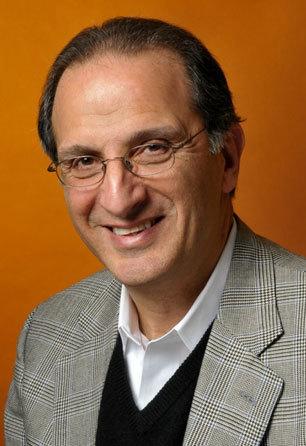
James Zogby (Courtesy of the Arab American Institute)
In some cases, even parish life in Washington can be viewed as a microcosm of the the heady mix of church and politics that will quickly become familiar to a new archbishop. The Shrine of the Most Blessed Sacrament in Chevy Chase has a long history of being a place where prominent Catholics on the left and right can set aside ideology and party, at least for an hour on Sunday.
"I remember looking around church one day years ago and Ted Kennedy was in front of me, Bill Bennett was behind me and Chris Matthews was also there," said James Zogby, a prominent liberal activist who has served as an informal advisor to Bernie Sanders and has been a parishioner at Blessed Sacrament since the early 1980s. Supreme Court Justice Brett Kavanaugh also attends the church, although some regulars say they have not seen him much since his confirmation hearings.
Over the years, the church has largely held together without divisions spilling out publicly. But during battles over health care reform in 2012, when Catholic bishops launched a high-profile and well-funded "Fortnight for Freedom" campaign against the Obama administration to oppose contraception funding in the landmark Affordable Care Act, many parishioners balked. Tensions broke through the surface when parish bulletins at the church, distributed nationwide by the U.S. bishop's conference, warned of grave threats to religious freedom and conscience.
Zogby and other parishioners crafted a statement expressing concern that "under the cover for religious liberty, the provision of universal health care — a priority of Catholic social teaching from the early years of the last century — is being turned into a wedge issue in a highly-charged political environment and that our parish, and indeed the wider church, is in danger of being rent asunder by partisan politics." The archdiocese dispatched their legal counsel and two other officials to answer parishioners' questions, Zogby said, and exchanges grew testy. The pastor stopped making announcements in the church about the Fortnight.
'Whatever Mass you go to there is noticeable attrition ... a kind of giving up with many people I talk to.'
—James Zogby
More recently, the clergy abuse crisis and divisions at the parish over the Kavanaugh hearings have taken a toll. "Whatever Mass you go to there is noticeable attrition," Zogby said. "There is a kind of giving up with many people I talk to."
He recalls a tense meeting with leaders at the U.S. bishops' conference after the Boston scandals erupted. Zogby's brother, John, a prominent pollster, came with stacks of sobering opinion data about Catholics' views on the crisis. "It was close to Holy Week, and I encouraged the bishops to prostrate themselves in front of their congregations and beg for forgiveness," he said. "The conversation immediately shifted to administrative issues. My brother turns to me and says, 'Now I know what it must have felt like to work in the Nixon White House.' We were talking about saving the church and they were talking about saving the institution. I'm not sure even now they have learned their lessons."
Zogby, founder and president of the Arab American Institute, still thinks public displays of penance — including signs outside of churches that visibly convey a posture of contrition — are needed along with more accountability and transparency. "This is especially true here because McCarrick was such a larger than life character," he said. "I traveled with him in the Middle East and saw the role he played in Muslim Christian dialogue and on issues of war and peace. In some cases, for my generation, he was the hope of the future and to see what happened was quite crushing, and to see it happen without the hierarchy really saying there was something fundamentally wrong not just with his behavior, but with the way he was protected by the institution was devastating."
It's not only Catholic progressives who want to see the next archbishop in Washington tackle the abuse crisis head on. Ashley McGuire is a frequent media commentator, pro-life activist and author of Sex Scandal: The Drive to Abolish Male and Female.
The senior fellow at The Catholic Association, which focuses on religious liberty issues, says a new archbishop needs to show "courage and clarity," two qualities she notes that are "sorely lacking in this city." The 33-year-old attends St. Thomas Apostle Church in Woodley Park. "Clear and courageous leadership is needed right now within the church as it navigates a way out of the current abuse crisis and toward a new era of reform and transparency within the hierarchy," she said.
Stephen White, a fellow in the Catholic studies program at the conservative Ethics & Public Policy Center, agrees. "That the next archbishop will inherit a difficult pastoral situation goes without saying," said White, the author of Red, White, Blue, and Catholic,and coordinator of an annual summer seminar in Krakow, Poland, on Catholic social teaching that focuses on the thought of Pope John Paul II.
In February, White was named executive director of The Catholic Project, a new initiative of Catholic University pushing for more lay leadership in addressing clergy abuse. "The archbishop will have to prioritize the needs of a hurting and angry flock while enduring the intense media scrutiny that comes with being the head of the Catholic Church in the nation's capital."
Catholic odd couples
The veteran journalist Cokie Roberts of ABC News is well acquainted with that intense media glare and the power politics in Washington both as a reporter and as the daughter of the late Lindy Boggs, the first woman from Louisiana elected to the House of Representatives, and the late Hale Boggs, a former House majority leader who died in a plane crash in Alaska.Lindy Boggs went on to serve as ambassador to the Vatican in the Clinton administration.
"The archbishop here understands part of their job is to represent the church to government, and he has sitting in front of him some very powerful people making legislation and decisions on the Supreme Court," Roberts said. "It's a dicey position to be in."
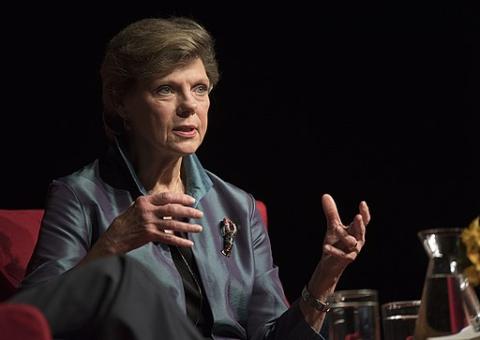
Cokie Roberts speaks at an event at the Lyndon B. Johnson Presidential Library in February 2017. (Wikimedia Commons)
Roberts was reminded of the unusual mix of Catholicism and power when she attended a "Blessing of Throats" service on the feast day of St. Blaise at her parish Little Flower in Bethesda. On the way to receive the traditional blessing with crossed candles placed on the throat, she noticed the Chief Justice of the Supreme Court John Roberts was also in line.
Despite the increasingly toxic rhetoric and divisions in Washington, Roberts believes a shared Catholic faith can sometimes play a role in forging unlikely relationships. "It's hard to bring people together here, but there is a certain amount of Catholic connection," she said, noting that fellow Catholics House Speaker Nancy Pelosi and Republican Steve Scalise, the House minority whip, are an example.
Another Catholic odd couple? The late Sen. Ted Kennedy and now retired former House Speaker John Boehner, fierce political opponents on most issues, teamed up to raise more than $5 million to support Catholic schools in Washington by hosting an annual gala event that became known as the Boehner-Kennedy Dinner.
Roberts says her faith isn't shaken by the abuse crisis but her frustration and anger at the hierarchy has only grown. In particular, she thinks the next archbishop has to make sure more women are empowered in the church. "Anything bishops set up, any panel or committee or investigative arm has got to have women," she said. "If you're not going to open up the most powerful positions in the church to women as clergy, then you have to give them strength in numbers."
Her elevator speech to the next archbishop? "Listen to Sister Carol," she said, referring to Sister Carol Keehan, the CEO of the Catholic Health Association. "She knows more about politics and how to get things done than anyone." Keehan's advocacy in 2010 played such a key role in securing health care reform that President Obama, at a 2015 event, acknowledged "we would not have gotten the Affordable Care Act done had it not been for her."
Politics, religion and race
The intersection of government, politics and Catholicism has long been a part of the city's history. Holy Trinity Church in Georgetown is a central part of that story. Founded in 1787 by Jesuits, it's the oldest parish and church in continuous operation in Washington. The Catholic community in the nation's capital far predates the formal establishment of the archdiocese, which didn't officially come into existence until 1939, when Pope Pius XII created it as a separate diocese.
Washington was originally part of the Archdiocese of Baltimore, the first Catholic diocese in the country. Holy Trinity has been the spiritual home to a number of elected officials, lobbyists and prominent journalists over the years. When he lived in Georgetown as a House member, senator and president-elect John F. Kennedy regularly attended Mass here, including on the morning of his inauguration.
"In some ways we're ground zero when it comes to politics," acknowledges pastor Jesuit Fr. Kevin Gillespie. Prominent Catholics who have called Holy Trinity their spiritual home over the years include Nancy Pelosi and the late NBC News journalist Tim Russert.
In February, the funeral Mass for the legendary former U.S. Rep. John Dingell of Michigan was held at Holy Trinity, where he worshipped when he was in town, and where he married his wife, Rep. Debbie Dingell, in 1981. Bill Clinton gave the eulogy. Jesuit Fr. Pat Conroy, the House chaplain, presided at the Mass. Gillepsie calls it a "creative challenge" to lead a church where politics is ubiquitous. "We've had presidents, senators and cabinet members who are comfortable worshipping here, and people on both sides of the aisle come up for communion. We want to be a welcoming community."
While Holy Trinity is a touchstone on the map of elite Catholic D.C., it has a robust social justice ministry. Parishioners have worked on issues ranging from homelessness to gun violence. The church has adopted a family from Syria and has sister parishes in El Salvador and Haiti. Gillespie hopes that whomever is named archbishop will be able to heal wounds, whether those caused by racism, poverty or the clergy abuse crisis. "We need someone who can listen to the pain that people have because we're all in pain at different levels," he said. "But we also need someone who can inspire hope and has a vision that can complement Pope Francis' vision of going out to the people."
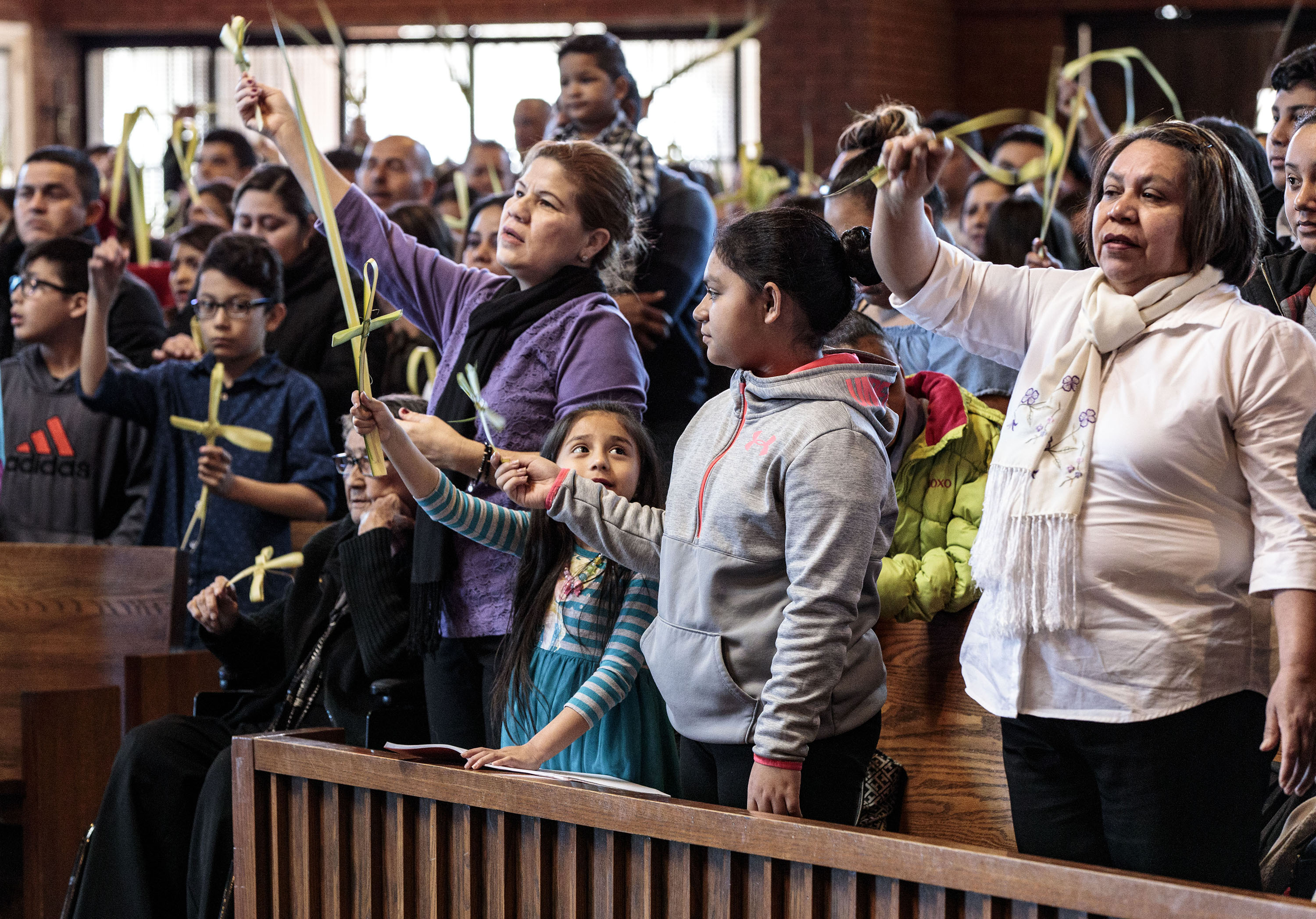
Worshippers hold up palm fronds during Palm Sunday Mass March 25, 2018, at St. Camillus Church in Silver Spring, Maryland. (CNS photo/Octavio Duran)
St. Camillus Parish takes that vision seriously. Located just outside of the district in Silver Spring, Maryland, it's one of the largest and most diverse parishes in the archdiocese. Parishioners come from nearly 100 countries, with heavy representation from West Africa, Central America and Haiti. Mass readings are often delivered in English, Spanish and French/Creole. The Bengali-American Christian Association, based at St. Camillus, resources the Bengali Catholic community in Maryland, Virginia and Washington.
A service group at the church called St. Francis Builds, started more than a decade ago, took volunteers to Puerto Rico in the wake of Hurricane Maria, and congregants have traveled to Guatemala, El Salvador, Trinidad and Jordan to help build homes. Closer to home, church leaders coordinate a food pantry and mission in nearby Langley Park. A 49-unit apartment complex, Victoria Oaks at St. Camillus, provides low-income housing to seniors.
Jamie Kralovec, along with his wife Cassie, have been parishioners for 10 years. "The parish leadership thinks interculturally and finds ways to bring people together while respecting the uniqueness of each group," he said. The 34-year-old University of Notre Dame graduate, who worked on urban planning issues in the Obama administration and now teaches at Georgetown University's School of Continuing Studies, says that beyond service projects the parish is also committed to legislative and policy advocacy for undocumented students and hosts an annual polar bear plunge to raise awareness about climate change.
"I hope that the new archbishop recognizes in St. Camillus a model for the archdiocese that can bring together Catholics from across differences of national origin, class and race," Kralovec said. "Our local church is blessed with such diversity and the archbishop has an opportunity to celebrate our multi-cultural richness by encouraging more unity and shared understanding in the diocese."
Any discussion of diversity in the district must include the city's rich African-American history. There is much to celebrate in that story, but also unresolved tensions, as a once predominately black city now grapples with change that often comes with a cost for lower income residents.The first city in the country to have an African-American majority, Washington's black population slipped below 50 percent for the first time in 2011. The Catholic experience here is inseparable from our nation's original sin.
The Maryland Jesuits owned slaves, and in 1838 they sold 272 men, women and children to help pay the debts of what is now Georgetown University. The university, beginning in 2016, began an often emotional process to finally address that legacy, seeking both repentance for the sins of racism in the past and tangible ways to address persistent racial injustice today. Descendants of slaves are now given preference in admissions to the university. Two buildings on campus once named for school presidents who organized that slave trade have been re-named to honor one of those slaves, Isaac Hawkins and Anne Marie Becraft, a black 19th century educator.
The Georgetown student government recently announced that in April students will vote on whether to establish a fund for descendants of slaves that would be paid in part by a $27.20 per student fee collected every semester. The $27.20 amount was chosen to symbolically honor the number of slaves sold by the Jesuit community.
Across town at St. Augustine Church, founded in 1858 and built in part by emancipated slaves, Fr. Patrick Smith leads a congregation where older parishioners still have vivid memories of burning buildings and the National Guard patrolling the streets after the assassination of Martin Luther King Jr. Today there are more luxury condos and chic restaurants than affordable housing in the trendy U Street and Shaw neighborhoods. The word gentrification can spark heated debates over race, class and privilege.
"We need a leader who is open to learn about and appreciate the rich history of black Catholics in this archdiocese," Smith said. A new archbishop can build on the legacy of his predecessors, Smith thinks. He pointed to the "courageous and prophetic witness" of Archbishop Patrick O'Boyle, who desegregated Catholic schools in the Washington archdiocese six years before the landmark 1954 Brown v. Board of Education Supreme Court decision. In the 1980s, he noted, Cardinal James Hickey created a consortium that fully funded poorer and predominately African-American Catholic schools.
Over the last decade, Smith said, "too many initiatives and actions for and to the black Catholic community left many of us leaders scratching our heads saying, 'Who came up with that?' or 'Who thought that should be a priority?"
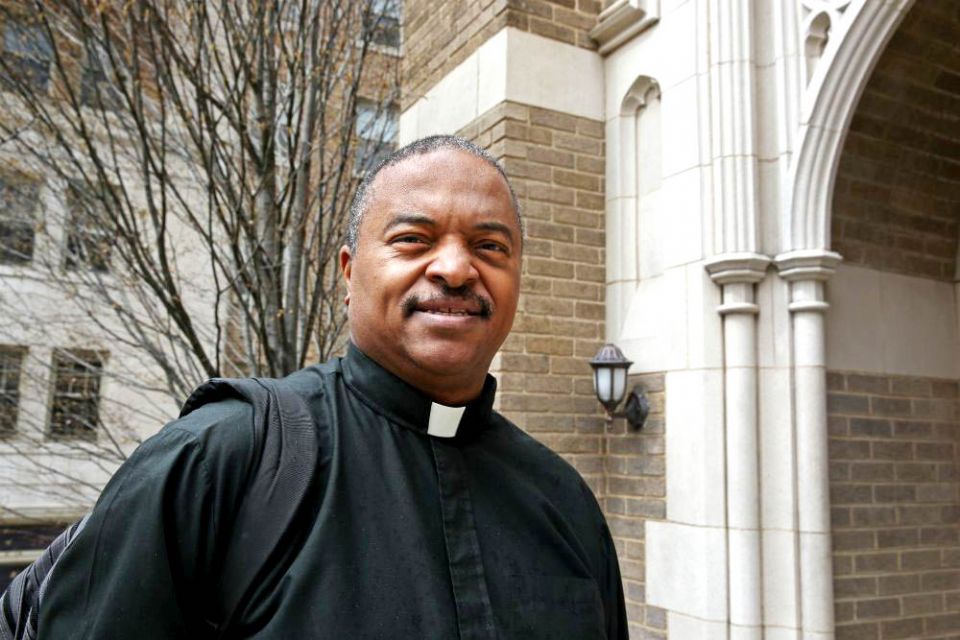
Fr. Patrick Smith, pastor of St. Augustine parish in Washington, D.C. (Rick Reinhard)
A similar disconnect sometimes happens between the archdiocese and the Hispanic Catholic community in Washington, according to Javier Bustamante, director of the Center for Cultural Engagement at The Catholic University of America.
Bustamante, 37, worked for the archdiocese for three years leading the cultural diversity office. In that role, he coordinated a major Encuentro process that included engaging 7,000 young Hispanic Catholics in parishes across the archdiocese.
A delegation from Washington traveled to Texas last fall to participate in a national Encuentro gathering with more than 3,000 Hispanic Catholic leaders from across the country. "We saw it as a sign of hope that so many young people were involved, but the big concern these young people had was feeling a lack of accompaniment," Bustamante said. "They want to be protagonistas and are looking for opportunities to serve."
In some cases, he noted, a lack of theological training makes it hard for young Hispanics to play formal roles in parishes and in the diocese. "They are very energized and trying to find ways to bring their experience into the church," Bustamante said. "What I hear from them is that the archdiocese structure is challenging and the way in for them doesn't exist. There are roadblocks. Part of it is we need to reimagine how we give them opportunities and think about what we mean by experience that is considered valuable. But they are fired up and want to be involved."
Bustamante thinks the new archbishop should be "present to the Hispanic community, and by present I don't mean just saying Mass once a year with Hispanics, but someone who is consistently accompanying the community whether it is through liturgy or activism," he said. "There is a large Salvadoran and Central American community here, and many immigrants are facing the loss of Temporary Protected Status (TPS)" under Trump Administration rules, "so we need a leader who really articulates in a clear way why this anti-immigrant rhetoric is an affront to our faith, someone who is not afraid to speak up in defense of our community."
Reaching out to the margins
How the next archbishop relates to Catholic activists in and around the city is something that Sister of Notre Dame de Namur Patricia Chappell, director of Pax Christi USA, will be watching. Washington and its suburbs are home to advocacy organizations and women religious groups such as Network, Pax Christi USA, the Leadership Conference of Women Religious, the Franciscan Action Network, Maryknoll Office for Global Concerns, the Catholic Mobilizing Network and the Sisters of Mercy of the Americas.
'We need a leader who really articulates in a clear way why this anti-immigrant rhetoric is an affront to our faith, someone who is not afraid to speak up in defense of our community.'
—Javier Bustamante
"I hope a new archbishop would be committed to reaching out to Catholic justice organizations and listening to the advocates of Catholic social teachings which are the foundational principles of all of our work," Chappell said. One opportunity the Pax Christi leader sees for a new archbishop is collaborating with justice groups and lay Catholics to "break open the recent bishops' pastoral letter on racial justice and come up with practical and honest suggestions for its implementation on the local level through parishes, religious communities, educational institutions and other diocesan structures."
Jean Stokan, a member of the Institute Justice Team for the Sisters of Mercy of the Americas, wants the next leader of the archdiocese to recognize the gravity of the current political climate.
"We're living in an urgent moment in our country, as fearmongering and forces promoting white supremacy, violence and anti-immigrant hate, are loud and dangerous," Stokan said. "We would like to bring immigrant-led groups to meet with the new archbishop to hear first-hand the perspective of those living under fear of deportation and others made poor and marginalized.We need to reclaim what it means to be a moral voice, and we hope that the new archbishop could make social justice a central part of the ministry of being a church leader."
In her advocacy on Capitol Hill, Social Service Sr. Simone Campbell, executive director of Network, a Catholic social justice lobbying group, hasn't found enough bishops challenging public policies that contribute to inequality and exclusion.
"Church leadership has not done much to engage the structural issues that perpetuate poverty and racism," she said. "It would be so refreshing to have a leader who spoke about and lived Pope Francis writings. We need a leader who knows and will call out both structures of poverty and the structures of racism."
But Campbell knows that before that can happen effectively healing is needed. "The Washington that I operate in is a political town with pastoral needs," she said. "There are many Catholics, both elected members and people who are employed in government, who have been hurt by church leadership. I have heard stories from many members of Congress about being denied Communion. This hurt continues. Many have been harshly judged by church leadership without dialogue or engagement."
The revelations of sexual abuse by former Cardinal Theodore McCarrick, she said, was the "last straw" for many people. "He was seen by many on the Hill as a pastoral leader who did seek a broader perspective. But his abuses have shattered many Catholics' trust in the church and leadership. I know of several folks who have stopped going to church because of this."
These raw emotions are not just felt by Catholics who spend their days in the corridors of power on Capitol Hill. "I go to Mass every Sunday, but sometimes I haven't gone to Communion because I've been so angry at the church," said Gregory Chronister, 65, a longtime district resident and a member of St. Thomas Apostle. "As a Catholic who is gay, I'm both disgusted by the scandals and sick of the Church's dishonesty on the subject of homosexuality. That dishonesty drives away gay Catholics who are leading good lives, and it has helped corrupt the institution itself. But the remedy isn't an anti-gay crusade that targets priests even if they're striving to be faithful to their vows."
He wants to see the next archbishop of Washington drop the clerical trappings and set a humble example for all bishops.
"Get rid of the fancy rings, the jeweled crosses, the coats of arms," Chronister said. "Then make listening to laypeople, and to parish priests and deacons and sisters, a regular and genuine part of how you lead us. Act more like a mayor and less like a monarch."
[John Gehring is Catholic program director at Faith in Public Life, and author of The Francis Effect: A Radical Pope's Challenge to the American Catholic Church.]
